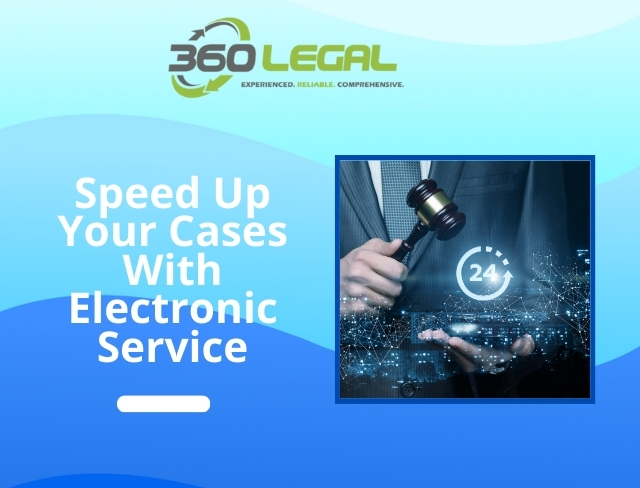Testing RSS Feeds.. ignore post.
Testing RSS Feeds.. ignore post.
Speed Up Your Cases With Electronic Service

Once defendants have been properly served in person, electronic service provides an efficient avenue for law firms to deliver subsequent legal documents and filings. By utilizing secure online platforms, attorneys can electronically serve various paperwork and submissions that arise later in a case. This eliminates expenses related to printing, mailing, and personally conveying every filing. Key benefits of e-service include instantaneous transmission, prompt delivery confirmation, convenient tracking tools, and easy integration with court e-filing frameworks.
Electronic Service Solves Pain Points of Traditional Service
Service of process ensures parties receive legal notices that meet due process requirements. But traditional personal service often requires multiple attempts across several weeks before physically delivering notices. Even routine service by mail suffers uncertainty from postal delays and delivery failures.
Electronic service provides a faster, more reliable solution by sending notices through secure online platforms. E-service also reduces organizational hassles by keeping all records organized in a digital portal. Overall, implementing electronic service allows law firms to save time and money while handling legal paperwork after the initial complaint has been formally served in person.
This allows attorneys to concentrate more on core legal work rather than logistical administration. Modern legal technology continues advancing as well to streamline post-service communication through innovative new platforms.
Florida’s Expanded Electronic Service Rules
Florida courts adopted e-filing in 2008, revolutionizing the way legal documents are processed and filed in the state.Recognizing electronic services’ vast capabilities to accelerate legal proceedings, Florida expanded rules around its use.
The following is a DRAMATIZATION AND IS NOT AN ACTUAL EVENT: For example, after serving defendant ZYX Corp to commence a breach of contract lawsuit, Smith & Associates electronically filed all subsequent motions, notices, and documents through Florida’s online docketing portal. ZYX’s attorneys received instant email alerts to new filings and downloaded them directly from the portal. This enabled quick document exchanges and kept the case moving swiftly toward resolution.
Streamlining Legal Logistics Through Electronic Service
Receiving formal notice through proper channels stands as an indispensable pillar of due process. However, conventional paper-based service often strains organizational bandwidth and budgets.
Law firms repeatedly contend with expenses from printing, mailing, and tracking volumes of physical documents. While essential, these routine legal procedures drain time, labor, and financial resources.
Electronic service (e-service) platforms offer a versatile digital solution to seamlessly streamline documents. Secure web-based tools provide rapid transmission, real-time delivery confirmation, and cloud-based access across cases.
It also reduces overhead through paperless filing while accelerating transmittal speeds. It minimizes organizational hassles, enhances tracking abilities, and tightens cost controls. Some platforms cater to legal settings with round-the-clock technical support.
Through electronic filing, court and office workflows improve through digital organization and rapid information sharing.
Benefits of Electronic Service for Law Firms
Saves Time and Money
It also saves time over routine mail service and avoids postal delays.
Increases Efficiency
Instant downloads from online platforms give attorneys faster access to case documents instead of waiting days for mailed hard copies.
Allows Faster Legal Proceedings
By accelerating document delivery, electronic service helps cases progress more quickly to resolution, satisfying clients with faster outcomes.
The following is a DRAMATIZATION AND IS NOT AN ACTUAL EVENT: For Smith & Associates, switching to electronic service reduced time chasing paper trails and enabled completing more casework with existing resources. The firm’s clients benefited from matters resolving weeks or months sooner.
Approved Electronic Service Platforms
Florida authorizes several web-based platforms expanded electronic service. Users register with one of these state certified online platforms that provide portals for securely uploading case documents.
How Expanded Electronic Service Works
After initially serving notice through traditional means, attorneys e-file most subsequent motions, requests, and documents in the case. The court’s electronic portal instantly emails case participants to alert of new filings available for download.
This avoids delays waiting for traditional service and benefits all sides with quicker case resolution.
Switch Your Firm to Electronic Service Today
Follow these best practices to adopt expanded electronic service:
1. Select a Certified Platform
Register with the state’s approved platforms.
2. Update Processes
Adjust your law firm’s workflows to shift eligible document service to your electronic platform.
3. Reallocate Resources
Reduce reliance on process servers to refocus time and cost savings to other legal work.
FAQs
1. What types of documents qualify for electronic service under expanded rules?
Common motion documents, requests for discovery, notices, and most filings made after initially serving the complaint or petition generally qualify for electronic service.
2. When does electronic service not apply?
Processes that still require personal service include serving amended complaints, subpoenas, restraining orders, or critical motions like for summary judgement or to compel.
Conclusion
Don’t let outdated reliance on traditional service drag down your law firm’s productivity. Leverage secure expanded electronic service tools to satisfy clients and gain a competitive edge. Contact 360 Legal today to implement faster electronic processes and get your cases resolved in record time!
360 Legal provides innovative approaches to judicial support services. Visit our website https://www.360legal.net to learn more about our electronic service solutions.
Author
We are Social!
Latest tweets
Popular Tags
Testimonials
"5 star service ! prompt serving, helpful, professional . "
"Mike is awesome. Our firm has hired him on several occasions and we are very happy with his work. His prompt serving, helpful, professional and always in communication. I recommend him highly! "
"360Legal provides speedy and easy to use Process Service that is flexible, and very transparent with nearly instant reporting. It is very helpful for us to be able to track the status of our process service jobs, especially when they are time sensitive. "
Latest News
-

RMAI 2021 Annual Conference RMAI Annual Conference
April 12-15, 2021 -

NATIONAL CREDITORS BAR ASSOCIATION 2020 SPRING CONFERENCE
May 19-21, 2021 -

ALFN ANSWERS 2021
Jul 18-21, 2021 -

Annual Convention and Expo
Oct. 17-21, 2021 -

Florida Association of Professional Process Servers 33rd Quarter Board Meeting/Professional Beach Getaway
Aug. 20-22, 2021












